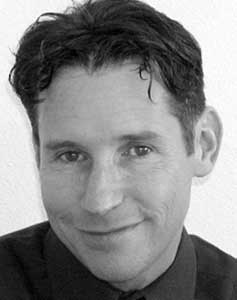-
- Ratzinger becomes pope
- Connecticut lawmakers pass civil unions bill
- Oregon Supreme Court nullifies 3,000 same-sex marriage licenses issued a year ago
- Conservatives launch anti-gay day
- AIDS activists divided on drug trial
- Andrea Dworkin, radical lightning rod for the feminist movement, dies at 58
- National News Briefs
- World News Briefs
commentary
Sex and the city council of San Diego
Published Thursday, 21-Apr-2005 in issue 904
BEYOND THE BRIEFS: sex, politics and law
IIn a few short weeks, San Diegans will be treated to a major corruption trial involving city leaders. Will the trial involve those responsible for a $2 billion pension deficit? Will it involve those responsible for representing to purchasers of city bonds that the city’s fiscal house was in order?
No. This is the case that will put on trial two city council members who are accused of doing what city council people do: accepting campaign contributions from those with business before the city, and then, when elected, try to help those contributors.
Over the years, we’ve watched members of the city council solicit funds from developers. Then, when elected, these council members ignore staff, community and planning commission suggestions, and they vote for projects that are too burdensome for an area. There’s a monument to this practice. It’s called Mission Valley.
However, the subject here is not a development. If that were the case, then the U.S. Attorney would have to indict the entire council and all of San Diego’s building establishment. Rather, this case is about an obscure law in San Diego that prevents dancers in strip clubs from touching customers.
Owners of the strip clubs wanted the law repealed. They should have done what strip-club owners in Los Angeles did after the city council there enacted a no-touch rule. They circulated petitions and forced a special election. The council was forced to repeal the law.
The owners could have also challenged the law in California courts, and it’s possible that a California court would have ruled that the no-touching rule violates a dancer’s freedom to engage in lap dancing, which is a protected form of speech.
But, instead, the owners hired a lobbyist who met with several council members, including Michael Zucchet and Ralph Inzunza. On May 2, the start of the trial, we’ll see what the U.S. Attorney has in terms of evidence.
Even though Zucchet and Inzunza have two of the very best criminal defense lawyers in the nation, the U.S. Attorney simply has to show that the two men did “something improper” while using a telephone.
The case is getting much more press lately because the U.S. Attorney disclosed some of the taped conversations between the council members and the lobbyist. In one tape, for example, Councilmember Zucchet discloses that while attending a bachelor party in Las Vegas there was some “in-room” entertainment.
“If this tape does come in, the jury will probably never know whether Councilmember Zucchet actually participated in any ‘in-room’ entertainment.” The U.S. Attorney would like to get this before the jury to show that there was a relationship between the men. This is helpful in proving a conspiracy to commit “wire fraud.”
Of course, it could just be several straight men talking about what goes on at bachelor parties and at strip clubs.
If this tape does come in, the jury will probably never know whether Councilmember Zucchet actually participated in any “in-room” entertainment. They will be left to ponder, speculate, and the gay members of the jury can fantasize…
“Day of Silence” and “Day of Truth?” The day after Martin Luther King Day, white students come to school attired in Confederate flags and white hoods (KKK garb). They want to express their view that slavery was a valuable institution, and that God never intended for the races to be equal.
After a performance of The Diary of Anne Frank, students come to school wearing T-shirts saying, “The Holocaust is a Myth” and “Jews killed the Lord.”
And, of course, the day after the Day of Silence, students come to school wearing T-shirts quoting scripture suggesting homosexuals deserve death.
But, of course, the African-American, Jewish and gay students are not supposed to feel harassed, intimidated or threatened. That’s absurd.
Because students must attend public school, the Supreme Court made clear in 1969 that schools cannot tolerate speech designed to harass, mock or intimidate fellow students. It’s that simple.
And if schools won’t protect GLBT kids from abuse, then it’s time for prosecutors to start charging teens who abuse other teens with child abuse.
|
|
Copyright © 2003-2025 Uptown Publications


